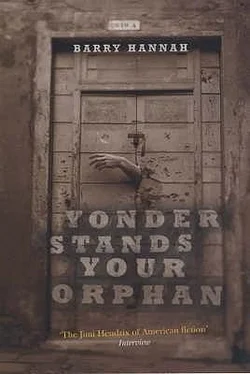Nobody had the right to touch the stories, the pictures, the silence. That was your due. Nobody could enter. No government was here. No phone calls, no mail, no knocks on the door. You saw old men on benches and you pitied them for all bereft, but you were wrong. They had the time of their life. The deaf ones even more so. Inside and away. They were inside a pure dream.
Roman resembled his grandfather on his mother’s side, a man struck blind by a train in his sixties. The old man sat in the chair grinning. Roman couldn’t recall a whine or complaint from him. As if he had crashed up safe somewhere, the water of an ocean bathing his feet. You would go to him for a memory and he spoke it.
Melanie was a fine lady but didn’t have enough stories in her, ones of her own. She borrowed from him. This was not so much too late as just impossible. If you couldn’t sit without stirring into somebody else’s life at age seventy-two, you had either bad stories or too few of them. When you had too few stories, you went mad. When you had only one, they took you away to the asylum until you got more.
The army had been a long mistake, but he could let that go. Somebody must be there as the platoon’s old animal and it was him. Sergeant major, watching West Point, Virginia Military and Citadel killed over and over. He regretted he was not a singing jazz-trumpet man like Chet Baker, but somebody had to be there regretting too. The army would rise up and grab you because it was vacant. You went to it young when even an army barracks was something fresh. The place filled you, or the unplace of it. Then you got wise enough to live. Others came close to you wanting to live also.
Roman hooked into something large and squirming. All his evenings contracted into this sweet emergency. Muscles underwater struggling against your arms, the line alive down to your belly and the butt of the new rod, Shakespeare the brand, answering. It had to be a cat, very big. As clear a gift as anything in the world. If he were a preacher, he would say that fish was God’s mercy. You never got closer to it than above the water for a long, long time. Here, bringing it home like a lost friend.
When he was young he cursed fish as he pulled them in. He no longer did. That was evil, stupid, greedy. Should lose your thumbs for it. For your mean and larcenous spirit. Now he loved this fishing peace above all things. He had not once been let down, even when nothing came home for him. The stories inside had been better over green water.
At the mouth of another cove near the bad restaurant, the one that he called Gristle and Sons with Cold Beer, he saw a pale-faced but arm- and shoulder-burned cracker bounced up and wallowing on a Jet Ski, a horrible and noi-some bully of a water motorcycle built in spite for the northern snowmobile, on which other punks roared and beheaded themselves on fence wire. The boy was doing about fifty over Roman’s quiet water. The wash from the machine was immense into the shallows, whipping water weeds and terrifying minnows and young bass toward Roman. The big catfish rolled in behind this local storm. Roman cursed the ski and saluted this bully. Old whiskered heavyweight at last snatched from its appetites. At last we meet . It was too big to be succulent, and he was glad to let it go after petting it.
When he turned to the lake again and threw his nightcrawlers and light sinker toward a stranded bough on a black strip of deep, he hoped he would not see another living soul, and he didn’t. Heard only the distant nagging whine of the ski.
The cracker Sponce was on the far side of the lake, seeking other audiences. A mad Protestant in a cathedral too green and black and silent for him, bent on fouling these spaces with the great I am .
THE COYOTE WAS IN HER COTTAGE BACKYARD SINGING to the edges of the swamp. She was naked in her solitude with nature. She sometimes saw deer and raccoon coming up to hear. And a thickage of squirrels, red and fox and gray. She saw mistletoe high on a dead post-oak limb and wanted it for her hair. She hated guns, but Raymond shot the mistletoe down for her with his newly confessed Mossberg. Now she had it in the hair above her ear.
The Coyote was much like John Roman. The young should have been seeking her instruction, but it was Raymond after her, and sometimes hard, wanting evermore an answer to her easy talents, her simple life. Still doing homework for his soul in his forties. His nervous dissertation.
He was a late-blooming prodigy on the saxophone. She could not read music much but she knew. Grant him that, even though he bought the band and managed it toward himself almost unintentionally. He had somehow gotten good through pure want. Triumph of his burnt doctor’s will. It was a puzzle why he played certain needy and vicious ways, or would even want to, like a tomcat dragging away from a long fight down an alley. Imprecations, hisses, mewlings, threats. Why develop this style when there were so many others?
They put something called a jellyball in horses’ stables to give them something to do. Or they put chickens, goats or radios in their stalls to be their friends, or a Jack Russell terrier. Otherwise they would get bored and kick themselves lame. Hurt others, bite. Maybe she was Raymond’s jellyball. And he needed another too, his talking saxophone. But who would not? Standing alone drives most mad in a single week. Look at Castro’s and Stalin’s prisoners. Mimi was on the right, happily and with great health. Her talent was committed on the day the Iron Curtain fell. She felt new lightness in her voice, the old gray seriousness with its laws left her. Her dispossessed grandparents were mocked in Havana for once having money and an ink factory. She could spit twenty feet across the room into the eye of a communist.
She was needing Raymond less and this would go on, but she loved him. They could walk together like a pair of face cards. It did not frighten her that their love was sometimes dead. It would come back and surprise you. She was fierce for loyalty.
Now she parted the limbs of the wild magnolia and froze at the sight of two skeletons sitting in the soil watching her. She did not hear the six males whispering not far behind them. Ulrich, Jacob, Isaac, Sponce, Carl Bob Feeney, his nephew Egan. Choir of voyeurs? Hunters? Lake idiots? They could be tourists spying on this cottage haunted by its terrors and chaos. Rude bastards. Where was the woman nailed to the wall? Where did the graveyard witch sleep?
She gave a yelp for Raymond and shut her eyes. When she opened them, she saw every male coming forward through holly hedges and giant ferns to assure her with their kindest apologies. Hurt on their faces. Max Raymond now right behind her with the stupid mistletoe rifle. Everything absurd was borne by this ministry, like a strange rural basketball team that had lost its ball. The skeletons smelled too.
“I love you,” said small Jacob.
Mimi screamed again, but with less power.
“Lady, we ain’t—” Jacob was paralyzed by her scream and jumped backwards into some vines, struggling, feet tangled.
“We’re sorry we seen you naked.”
Not us, the adults thought together.
“We tried not to look.”
“I don’t care whether the children. . Who are you?”
She lowered herself before the two boys now standing together. She would not look at the skeletons. When Raymond saw them, he chambered a round. The skulls with their stunned hilarity. Arms resting on the soil. Now the wiring job obvious, coat hangers. Done with pliers. This was the empty swamp she had been singing to without knowing. All this lively rot. Mimi went back to the cottage and grabbed her robe off the porch rail.
“We don’t know,” said Egan. “These bones have nothing to do with any of us. The boys put them together with wire. I’m a minister of the Lord Jesus Christ.” She’d already heard from Raymond about the tattoo of the cross on the man’s cheek.
Читать дальше











